ORCID
- Amir Aly: 0000-0001-5169-0679
- Ray Jones: 0000-0002-2963-3421
- Marius Varga: 0000-0001-7655-9829
- Dena Bazazian: 0000-0002-1229-4494
Abstract
Exploring the underwater world presents significant physical and financial barriers. Telepresence technologies offer a potential solution by a providing a more accessible version of an underwater experience. Our research involved a scoping review to consolidate previous findings on vision-based technologies that aim to recreate underwater experiences and their user evaluations. We searched 5 academic databases for papers describing or evaluating technologies providing visual underwater experiences without actual submersion. We systematically searched YouTube to include immersive experiences not documented in academic publications. Our review included 45 academic papers and 23 YouTube videos classified by their level of ‘reality’, ‘degrees of freedom’, and presence of interactive elements. The technologies reviewed included virtual reality, 360 video and imaging, augmented and mixed reality, head-mounted displays, mobile devices, cameras, sensors, remotely operated vehicles (ROVs), and games. Half of the selected papers featured user evaluations (with sample sizes ranging from 5 to 1006 participant); these methods included interviews, performance tracking, and questionnaires. We identified six main application areas for these technologies: (i) general environmental awareness, (ii) formal education about marine life, (iii) therapeutic interventions, (iv) access to underwater heritage sites, (v) ROV teleoperation and simulations, and (vi) entertainment. Immersive technologies, such as head-mounted displays and augmented reality, were prevalent across all application categories, though their usability varied. Cost considerations were also diverse, with costs ranging from expensive ROVs and simulated environments to cheaper 360 videos. Our findings indicate a need for more robust user studies, including long-term research and comparisons among real-time, pre-recorded, and simulated experiences. A better understanding of entertainment-driven applications could benefit education, environmental conservation, and healthcare. The findings of the scoping review are discussed with respect to the technologies identified and the corresponding user studies.
Publication Date
2024-06-28
Publication Title
Intelligent Marine Technology and Systems
Volume
2
Issue
19
ISSN
2948-1953
Acceptance Date
2024-06-04
Deposit Date
2024-08-21
Funding
The ICONIC project was awarded funding (March 2022) from UKRI/EPSRC (Grant No. EP/W024357/1).
Additional Links
https://link.springer.com/article/10.1007/s44295-024-00034-3
Recommended Citation
Hagen, O., Aly, A., Jones, R., Varga, M., & Bazazian, D. (2024) 'Beyond the surface: a scoping review of vision-based underwater experience technologies and user studies', Intelligent Marine Technology and Systems, 2(19). Retrieved from https://pearl.plymouth.ac.uk/secam-research/1471



